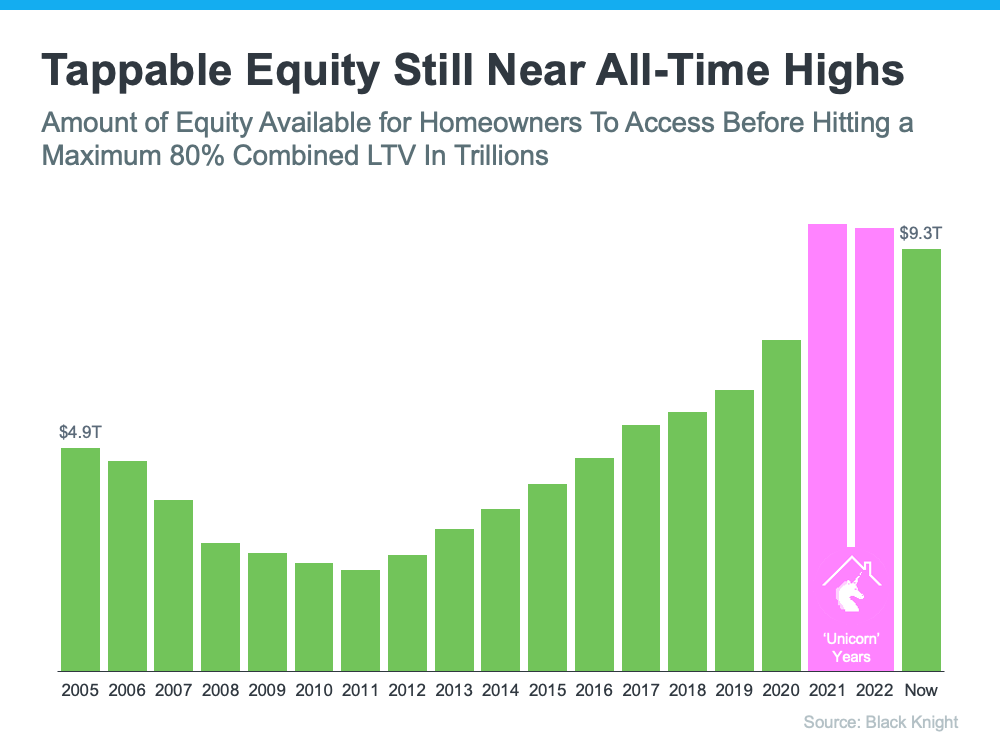A Drop in Equity Doesn’t Mean Low Equity

You may see media coverage talking about a drop in homeowner equity. What’s important to understand is that equity is tied closely to home values. So, when home prices appreciate, you can expect equity to grow. And when home prices decline, equity does too. Here’s how this has played out recently.
Home prices rose rapidly during the ‘unicorn’ years. That gave homeowners a considerable equity boost. But those ‘unicorn’ years couldn’t last forever. The market had to moderate at some point, and that’s what we saw last fall and winter.
As home prices dropped slightly in the back half of 2022, equity was impacted. Based on the most recent report from CoreLogic, there was a 0.7% dip in homeowner equity over the last year. However, the headlines reporting on that change aren’t painting the whole picture. The reality is, while home price depreciation during the second half of last year caused equity to drop, the data shows homeowners still have near record amounts of equity.
The graph below helps illustrate this point by looking at the total amount of tappable equity in this country going all the way back to 2005. Tappable equity is the amount of equity available for homeowners to access before hitting a maximum 80% loan-to-value ratio (LTV). As the data shows, there was a significant equity boost during the ‘unicorn’ years as home prices rapidly appreciated (see the pink in the graph below).
But here’s what’s key to realize – even though there’s been a small dip, total homeowner equity is still much higher than it was before the ‘unicorn’ years.
And there’s more good news. Recent home price reports show the worst home price declines are behind us, and prices have started to go up again. As Selma Hepp, Chief Economist at CoreLogic, explains:
“Home equity trends closely follow home price changes. As a result, while the average amount of equity declined from a year ago, it increased from the fourth quarter of 2022, as monthly home prices growth accelerated in early 2023.”
The last part of that quote is particularly important and is the piece of the puzzle the news is leaving out. To further emphasize the positive turn we’re already seeing, experts say home prices are forecast to appreciate at a more normal rate over the next year. In the same report, Hepp puts it this way:
“The average U.S. homeowner now has more than $274,000 in equity – up significantly from $182,000 before the pandemic. Also, while homeowners in some areas of the country who bought a property last spring have no equity as a result of price losses, forecasted home price appreciation over the next year should help many borrowers regain some of that lost equity.”
And even though Odeta Kushi, Deputy Chief Economist at First American, references a slightly different number, Kushi further validates the fact that homeowners have a lot of equity right now:
“Homeowners today have an average of $302,000 in equity in their homes.”
That means if you’ve owned your home for a few years, you likely still have way more equity than you did before the ‘unicorn’ years. And if you’ve owned your home for a year or less, the forecast for more typical price appreciation over the next year should mean your equity is already on the way back up.
Bottom Line
Context is everything when looking at headlines. While homeowner equity dropped some from last year, it’s still near all-time highs. Reach out to a trusted real estate professional so you can get the answers you deserve from an expert who’s there to help as you plan your move this year.
Understanding the Nuances of Equity: Why a Drop in Equity Doesn't Necessarily Mean Low Equity in San Antonio, TX
Equity is a crucial concept in real estate, representing the value of ownership in a property. While many homeowners in San Antonio, TX may worry about a drop in equity, it's essential to understand that a decline in equity does not automatically equate to low equity. In this detailed blog post, we will delve into the nuances of equity, debunk common misconceptions, and demonstrate how Grell Realty Group and The Grell Team can help you navigate the San Antonio real estate market with confidence. Let's explore why a drop in equity doesn't necessarily mean low equity.
1. Understanding Equity:
Equity is the difference between the current market value of your home and the outstanding balance on your mortgage. It represents the ownership stake you hold in your property. While it's ideal for equity to increase over time, various factors can cause fluctuations, including market conditions and mortgage payments.
2. Market Conditions and Property Value:
The real estate market is dynamic, and property values can fluctuate. A drop in equity may occur due to declining property values in your area. However, it's important to note that the overall market conditions can impact equity, and it doesn't necessarily mean that your equity is low compared to other homeowners in San Antonio.
3. Mortgage Payments and Principal Reduction:
Equity can also be affected by the amount of principal you have paid down on your mortgage. As you make mortgage payments, a portion goes toward reducing the principal balance. Even if property values experience a temporary decline, your equity can still be relatively high due to the reduction in mortgage debt.
4. Home Improvements and Appreciation Potential:
Investing in home improvements can enhance your property's value and potential for appreciation. By making strategic upgrades and renovations, you can positively impact your home's equity, even if market conditions fluctuate. Grell Realty Group and The Grell Team can offer insights on which home improvements have the highest return on investment in the San Antonio market.
5. Strategic Homeownership:
The duration of homeownership also plays a role in equity accumulation. Over time, as you consistently make mortgage payments, the principal balance decreases, leading to an increase in equity. By maintaining a long-term homeownership perspective, you can ride out market fluctuations and build substantial equity in the long run.
6. Professional Valuation and Market Analysis:
To accurately assess your equity position, it's crucial to rely on professional valuation and market analysis. Grell Realty Group and The Grell Team can provide comprehensive property evaluations, taking into account current market conditions, comparable sales data, and other relevant factors. This detailed analysis ensures you have an accurate understanding of your equity position.
7. Strategic Financial Planning:
A drop in equity can be an opportunity to reassess your financial goals and develop a strategic plan. Grell Realty Group and The Grell Team can help you explore refinancing options, leverage home equity for other investments, or provide guidance on adjusting your real estate portfolio to maximize long-term wealth accumulation.
Conclusion:
In the San Antonio real estate market, it's essential to understand that a drop in equity doesn't necessarily indicate low equity. Fluctuations in property values and market conditions can impact equity, but other factors such as mortgage payments, home improvements, and strategic homeownership play a significant role in building and maintaining equity. Trust in the expertise of Grell Realty Group and The Grell Team to provide accurate valuations, market insights, and strategic guidance to help you navigate the complexities of equity in San Antonio.
Recent Posts
![Achieve Your Dream of Homeownership with Condos and Townhomes [INFOGRAPHIC]](https://img.chime.me/image/fs/chimeblog/20240217/16/original_dfa7c035-5dfc-431f-9632-0a1387532bd1.png)




![Winning Plays for Buying a Home in Today’s Market [INFOGRAPHIC]](https://img.chime.me/image/fs/chimeblog/20240210/16/original_949ffbaa-7b98-4ded-bdcb-710d8e954a85.png)






